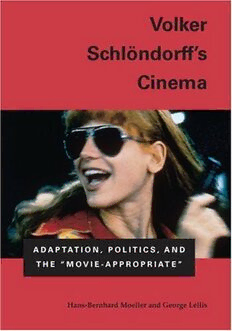
Volker Schlondorff's Cinema: Adaptation, Politics, and the ''Movie-Appropriate'' PDF
385 Pages·2002·10.483 MB·English
Most books are stored in the elastic cloud where traffic is expensive. For this reason, we have a limit on daily download.
Preview Volker Schlondorff's Cinema: Adaptation, Politics, and the ''Movie-Appropriate''
Description:
Volker Schl?ndorff’s Cinema: Adaptation, Politics and the “Movie-Appropriate” examines the work of major postwar German director Volker Schl?ndorff in historical, economic, and artistic contexts. Incorporating a film-by-film, twenty-eight chapter study, Hans-Bernhard Moeller & George Lellis reveal a complexity and formal ambitiousness of Schl?ndorff that is comparable to that found in Wenders, Herzog, and Fassbinder. In spite of Schl?ndorff’s successes with films like The Lost Honor of Katharina Blum and The Tin Drum, as well as his acclaimed work in the U.S. with Death of a Salesman, Gathering of Old Men and The Handmaid’s Tale, this is the first in-depth critical study of the filmmaker’s career. In the context of film and television history, this book relates Schl?ndorff’s oeuvre to the New German Cinema, to his formative years as a student and production assistant in France, and to his roots in the Weimar cinema’s tradition. It reveals how Schl?ndorff entered into the German film production system in the 1960s, how he came to rely on German public television in the 1970s, and then moved to the international and American financing in the 1980s, attempting to redevelop the Babelsberg studios in a 1990s post-Wall Germany while continuing to make his own films into the 21st century. The book captures how Schl?ndorff’s nearly half century of ongoing creativity and productivity ties together. The authors analyze the artistry of each Schl?ndorff movie arguing that his output as a whole embodies a provocative and sometimes contradictory set of balances. Schl?ndorff combines commercial interest with significant artistic ambition, blends the kinesthetic pleasures of moving images with the seriousness of fine literature, links the intensity of individualized personal experience to an awareness of broader political issues, and represents a specifically German sensibility even as he reaches out to the international audiences. The authors demonstrate the cyclical recurrence in his cinema of certain themes (individual and collective rebellion, fascist suppression, masochistic love), narrative patterns (the Western, the thriller, the subjective mood piece), and stylistic approaches (Brechtian Verfremdung, the creation of careful leitmotif structures, the use of the grotesque). In over thirty years of filmmaking, Schl?ndorff has produced a remarkable unified body of work that deserves the attention of a book-length study. Authors Hans-Bernhard Moeller and George Lellis offer the first such study of its kind. Volker Schl?ndorff’s Cinema: Adaptation, Politics, and the “Movie-Appropriate” features forty-one illustrations.
See more
The list of books you might like
Most books are stored in the elastic cloud where traffic is expensive. For this reason, we have a limit on daily download.
